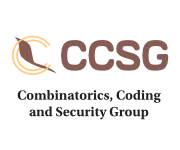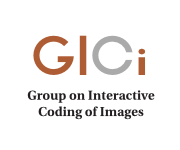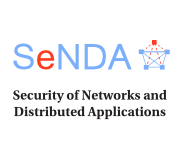Grups de recerca
El Departament acull tres grups de recerca:
- Combinatorics, Coding and Security Group (CCSG)
- Group on Interactive Coding of Images (GICI)
- Security of Networks and Distributed Applications (SENDA)



Combinatorics, Coding and Security Group (CCSG)
The Combinatorics, Coding and Security Group (CSCG, http://ccsg.uab.cat) has been working continuously since 1987 on projects on Information Theory, Coding Theory and Cryptography.
The group is focused on the study, construction and classification of nonlinear families of optimal codes for the detection and correction of errors in digital transmission systems and data storage by using both combinatorial and algebraic techniques. Specifically, the group has been studying the following families of codes: completely regular, perfect, Hadamard, Reed-Muller, Preparata, Kerdock and Z2Z4-linear, in cooperation with other internationally renowned groups.
In recent years, the members of the group have been researching on optimal codes with regularities (for example, completely regular codes and Hadamard codes) and on network coding. They have also studied the application of these codes in distributed storage, the integrity of stored data, cryptography, steganography, and the improvement of current product identification systems.
The group is also developing software within the Magma system, for experimentation and simulation of error correction codes, with the aim of contributing to its growth and providing tools for research in coding theory area. The new Magma libraries are available to the entire scientific community from the group website.
For the next three years, the members of the group will be focused on the following topics:
- Determine the connexions among regular codes, combinatorics and Locally Repairable Codes to study their application to the problem of multiple failures in distributed data storage nodes.
- Study the family of additive codes over finite fields, including Hadamard codes, and their application to quantum computing.
- Advance in the study of additive codes (Hadamard, simplex, MacDonald) on mixed alphabets, different copies of Z/ps rings, and the permutation decoding method for these codes.
- Continue the development of the Magma system for simulation and experimentation in coding theory, expanding the functions of the package for q-ary codes not necessarily linear on finite fields and creating a new package for codes on rings Z/ps.
Interest topics: Optimal codes, Z2Z4-linear codes, Network coding, Distributed storage, Steganography and hiding information, Locally Repairable Codes, Quantum codes
Group on Interactive Coding of Images (GICI)
The Group on Interactive Coding of Images (GICI) focuses on the study, design and implementation of image coding and transmission techniques and standards.
GICI is permanently investigating new compression methods for remote sensing data produced onboard satellites.
GICI focuses on developing algorithms with improved compression ratios, lower complexity and energy consumption, which can also guarantee a desired image quality for the images' purpose. This group's main areas of interest in remote sensing include:
- Hyperspectral coding
Multispectral and Hyperspectral images contain from tens to hundreds of spectral bands, each of which selectively detects some frequencies of light. In this way, we can observe not only visible light, but also infrared and ultraviolet radiation, which are extremely useful for Earth and Space observation tasks.
The high number of bands represents a challenge for efficient compression due to the increased complexity and energy requirements. At the same time, redundancy among the bands can be exploited to produce highly compact representation of the images.
We actively pursue this opportunity by researching novel spectral transforms and prediction models that can be efficiently applied onboard actual satellites.
- Satellite constellations
Lighter, cheaper satellites are starting to take over space. Earth observation is not limited to space agencies and big corporations anymore, and new players are deploying constellations of satellites to supply data for new and exciting applications.
Satellite constellations produce unprecedented, ever-growing amounts of image data that must be transmitted with limited bandwidth and energy availability.
GICI is creating algorithms specifically designed for satellite constellations, bearing in mind the aforementioned limitations, while also exploiting new and stimulating characteristics of the produced images and of the available hardware.
- CCSDS Recommendations
The Consultative Committee for Spatial Data Systems is an international forum conglomerating space agencies, aerospace companies and knowledge centers with the goal of producing and maintaining communication standards for remote sensing.
GICI regularly participates at the Multi-and Hyper-Spectral Data Compression work group, having made major contributions to published and under development standardization efforts, under the sponsorship of CNES.
- New compression paradigms
GICI also investigates cutting-edge approaches to compression, upcoming image types, and methods to provide innovative features to compression. Currently, we are particularly interested in three such paradigms: graph-based compression, point-cloud image coding and compressed data structures.
Security of Networks and Distributed Applications (SeNDA)
The Security of Networks and Distributed Applications (SeNDA) group has an extended research experience on security and privacy with special interest in distributed applications.
SeNDA is focused on applied security and privacy research, without leaving aside the theoretical foundations. Special interest is given to distributed systems and networks.
Currently, the group works on 3 main research lines:
-
Opportunistic Networks: novel routing, security and privacy mechanisms for opportunistic networks.
-
Blockchain Technology: study of current blockchain technologies and research novel approaches and solutions, including layer-2 protocols.
-
Privacy: data privacy, privacy-preserving data mining and privacy in machine learning.